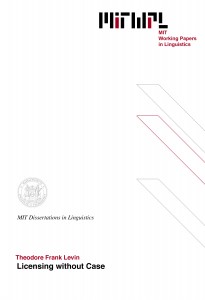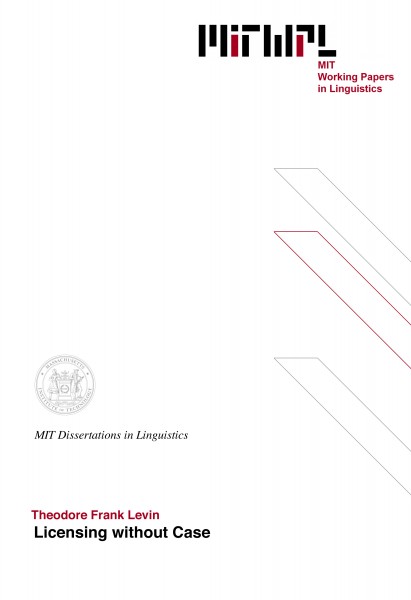Licensing without Case
Theodore F. Levin, 2015
Abstract Case is a conjectured syntactic property of noun phrases that accounts for aspects of their distribution and form that do not otherwise follow from their PF and LF content (Chomsky 1981, 1986; Chomsky & Lasnik 1995; Lasnik 2008). Traditionally, Case Theory consists of two core components: (i) noun phrase licensing – noun phrases must be licensed through syntactic dependencies, capturing their distribution; and (ii) noun phrase morphology – the licensing of noun phrases influences their morphological realizaiton, capturing their form. In work over the past decade or two, however, the distribution of noun phrases is largely ensured by the properties of clausal heads, independently of Case (e.g. Schütze 1993, 20001; Marantz 1991/2000; Chomsky & Lasnik 1995; Sigurðsson 1991, 2009). These considerations have led to, or been accompanied by, theories that shift the determination of case morphology to PF (e.g. Marantz 1991; Mc-Fadden 2004; Bobaljik 2008; Sigurðsson 2009, 2010). If these analyses are correct, there may be no role for C/case in syntax, at all.
In this dissertation, I argue that nominals must indeed be licensed during the course of a well-formed derivation. However, nominal licensing does not require Case-feature valuation, as is commonly assumed (Chomsky 2000, 2001). I demonstrate that Case-features can survive the derivation unvalued (Preminger 2011, 2014; Kornfilt & Preminger 2015). This conclusion invalidates the common view that nominals are licensed through obligatory Case-feature valuation, and phenomena that have commonly received Casetheoretic explanations based on such obligatory valuation are accorded alternative anlyses. Nevertheless, I demonstrate that presence/absence of the functional head K0 in the nominal projection does affect the distribution of nominals in ways reminiscent of, but not identical to, traditional Case theory. I identify three groups of nominals that enter the derivaton without K0: the objects of Pseudo Noun Incorporation constructions, the objects of Antipassive constructions, and the in situ subjects of Balinese and Malagasy. In each case, those nominals which entirely lack KP, the locus of Case-features, display unique distributional constraints, not captured under previous analyses of these phenomena. I suggest that the conditions under which nominals can be licensed without Case (K0) demonstrate that K0 is relevant for nominal licensing.
The result of this argumentation is a recasting of the core components of Case Theory. Noun phrase licensing is achieved by the K0 head itself (cf. Bittner & Hale 1996a,b). Its presence/absence accounts for aspects of a nominal’s distribution and form that do not otherwise follow from its PF/LF content. Noun phrase morphology is (indirectly) determined by how Case-features, hosted at K0, are valued, if at all.

